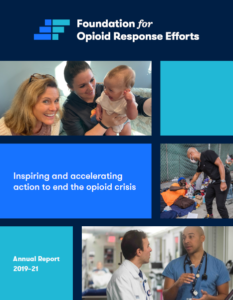News & Updates — FORE Announcements
President’s Update, Jan. ’22: Taking Stock of FORE’s First Two Years
January 19, 2022I’m proud to share that FORE has just published our first annual report, which describes how we’re advancing our mission to inspire and accelerate action to end the opioid crisis.

Through funds awarded between January 2020 and March 2021 totaling $12.7 million, our 42 inaugural grantees are helping to:
- Expand access to treatment for opioid use disorder (OUD). Some projects focus on emergency departments as places to engage people in treatment; others use hub-and-spoke training programs to substantially expand the number of primary care providers treating people with OUD. Many projects focus on groups that are often left out of traditional treatment approaches, including communities of color, rural residents, pregnant and parenting people, and those involved in the criminal justice system.
- Respond to the COVID-19 Pandemic. During the early months of the pandemic, evidence began to emerge that the winding down of addiction recovery meetings and other supports—as well as isolation and anxiety—were putting people in recovery from OUD at risk. We moved quickly to award grants to organizations that have helped people in recovery maintain their connections through virtual platforms. We’re also tracking state and federal policy changes such as allowing take-home doses of methadone or initiating OUD treatment via telehealth to glean lessons for the long term.
As is clear in our annual report, we’ve begun to build a strong community in our first couple of years. It includes grantees and advisors who are clinicians, recovery support workers, researchers, and policymakers from around the country; members of our Board and Scientific Advisory Council; and the thousands of people who attend our webinars, read our grantee spotlights and issue briefs, or follow us on Twitter, LinkedIn, or YouTube. We’re glad you’ve joined us; as FORE Board Chair Andrea Barthwell, MD, DFASAM, says in a video included in the annual report, ending the opioid crisis will require “all hands on deck: not just the policy experts, not just the medical specialists, but frontline clinicians with firsthand experience of addiction and also people in recovery.”
I’m so proud of the work we’ve done so far. We’re working quickly and deliberately to build on it with the launch of two new grant portfolios: one supporting innovative approaches to tackling longstanding problems such as the stigma against addiction and another supporting efforts to prevent opioid use disorder, with a focus on families. We’ll be sharing more on those and other efforts shortly. In the meantime, I hope you will take a few minutes to enjoy our annual report, and reach out to us if it generates comments or ideas. I wish you all the best for a safe, healthy, and joyous 2022.
Karen A. Scott, MD, MPH
President